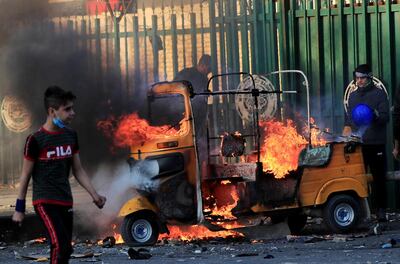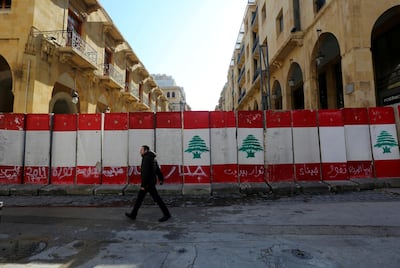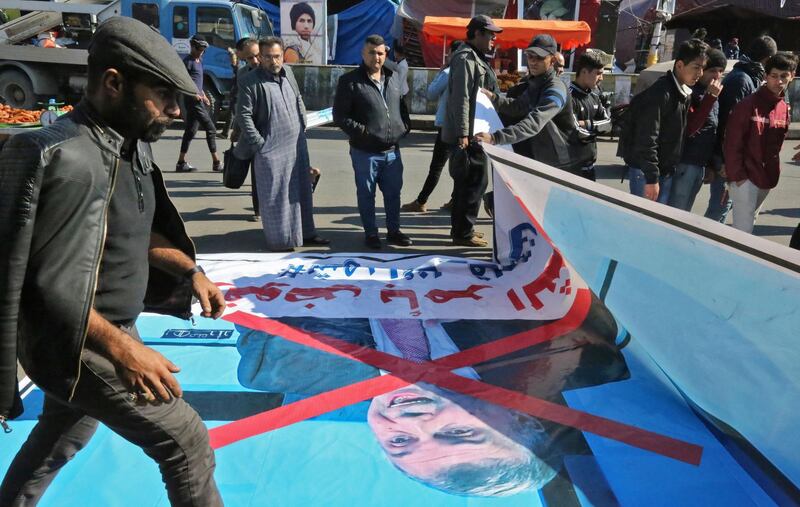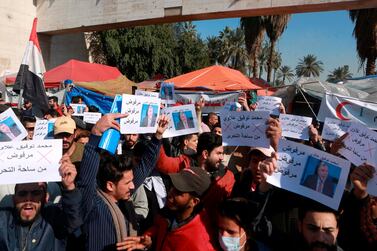Iraqi politicians are emulating Lebanon in their quest to quell dissent by nominating as prime minister a self-proclaimed outsider without the heft to counter the forces cracking down on the protest movement.
Mohammed Allawi, a former telecoms minister and a junior member in the former Iraqi opposition to Saddam Hussein, was tasked with forming a new government in Baghdad on Saturday.
Like Lebanon's new prime minister, Hassan Diab, Mr Allawi is less well known than his predecessors, who are viewed as part of the sectarian political system behind the malaise that triggered uprisings in Lebanon and Iraq two weeks apart in October.
Mr Allawi's nomination spurred demonstrations in Baghdad and southern Iraq, with thousands denouncing him and the political elite who nominated him.
But other Iraqis appear to have responded to calls by Moqtada Al Sadr, one of Mr Allawi's main backers, for his supporters to withdraw from the protests.
Ala Al Rikaby, a physician who emerged as one of the leaders of the protest movement in southern Iraq, said Mr Allawi "was imposed through the same unjust ways that we went out into the streets against", placing him "under the influence of those who brought him".
Mr Al Rikaby said the protest movement could either continue with its outright rejection of Mr Allawi or hold him accountable for his promises of fundamental political reform, justice for murdered protesters, protection for those still on the streets and the release of political prisoners.
In a video message to protesters on YouTube, Mr Al Rikaby said the first test would be whether Mr Allawi formed a government of independents.
“This would be a primary indicator of his seriousness,” he said. “If he cannot, he will be held primarily responsible and the people will have another say.”

Mr Allawi immediately sought to distance himself from the political and Iran-backed militia players behind his nomination – the same actors leading or supporting the crackdown that killed and abducted hundreds of non-violent demonstrators and civil activists since October.
In a video message posted on Twitter immediately after he was nominated, Mr Allawi said that if parliamentary blocs attempted to dictate his choice of ministers, he would “abandon this nomination and return as a regular citizen”.
He promised to "hold the killers accountable", fix the economy, combat corruption, introduce a new electoral law and hold fresh elections.
“If I do not fulfil your demands, then I do not deserve this appointment,” he said.
Mr Allawi's use of Twitter, rather than official media, was intended to convey the message that he was in tune with the youth-led protest movement.
Central to his nomination was consensus on his candidacy between Mr Al Sadr, a populist cleric who courted Shiites living in extreme poverty, and militias openly backed by Iran.
Mr Al Sadr turned against the Iraqi uprising after a US drone attack on January 3 killed Qassem Suleimani, Iran’s top regional enforcer.
Civil activists said some militiamen under Mr Al Sadr's command took part in attacks by security forces and militias on protest sites in Baghdad and other cities over the past two weeks.
On Sunday, Mr Al Sadr called on the authorities to deal with protesters who blocked roads and punish teachers who let pupils skip class to demonstrate, at the same time voicing the hope that Mr Allawi, whom he touts as a reformer, would be "acceptable to the people".
Mr Al Sadr apparently saw no problem with the contradiction between his message and the one put out by Mr Allawi, underlining the prime minister-designate’s lack of sway over his powerful backers.
The changes in Iraq and Lebanon are intended to satisfy protesters who are demanding political reforms and a restoration of the rule of law.

In Lebanon, the contradictions in the spoils system have manifested in the financial meltdown that regional bankers say has been under way since October.
The violence employed by Lebanese security forces and Hezbollah supporters against the protest movement produced relatively few casualties.
But the use of force escalated over in recent weeks, with rubber bullets severely wounding several demonstrators in Beirut, leading to a significant reduction in the size of the protest movement.
Mr Diab has sought to portray himself as an answer to the protest movement but his interior minister, Mohammad Fahmi, belongs to the Syrian-backed old guard.
Mr Fahmi headed military intelligence for the last eight of Syria's 29 years of control over Lebanon, which ended months after the 2005 assassination of Lebanese prime minister Rafik Hariri.
Mr Fahmi’s last job was head of security at Lebanon’s largest bank.
In Iraq, the bloodier crackdown pits the Shiite-dominated political class against masses of their co-religionists.
The protesters are young and from disadvantaged sections of society that lost out to political and religious families, merchants and militias who emerged after the US-led invasion that toppled Saddam in 2003.
An attempt by the judiciary in December to arrest an army commander for the deaths of dozens of demonstrators went nowhere after the military protected him.
The Defence Ministry said Gen Jamil Al Shammari was “courageous and heroic”.
Without a foothold in the army or security apparatus, and with militias backed by Iran influencing both, Mr Diab and Mr Allawi will not be able to control forces nominally under their command.
Their lack of a base will make it difficult to move against the interests of the establishment.







